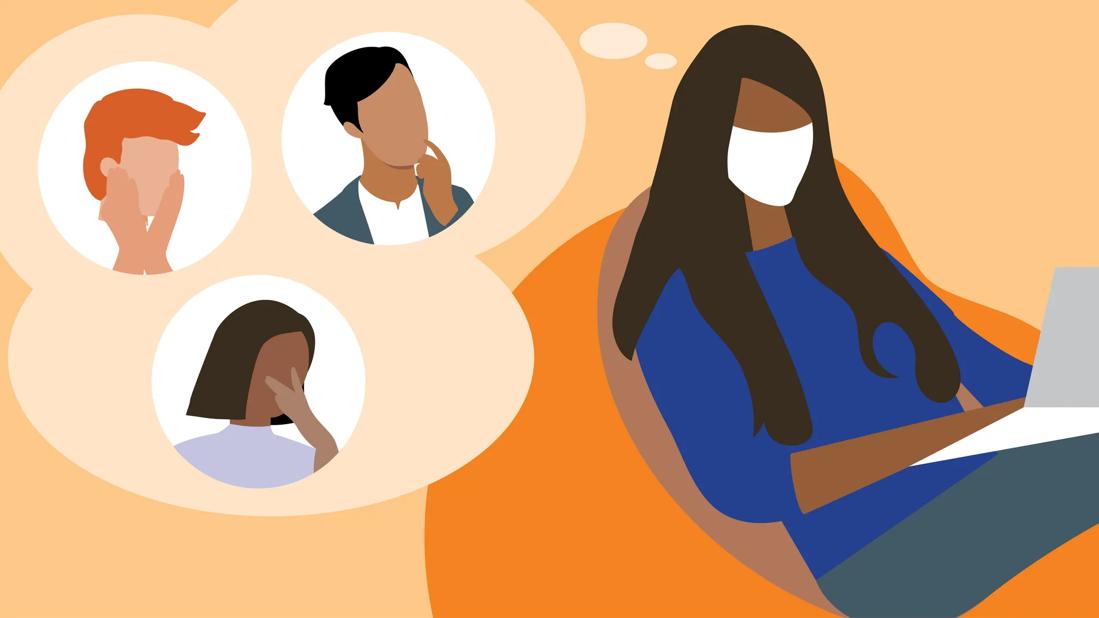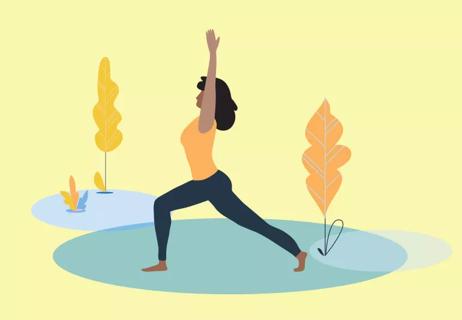Face-touching is a common habit, but one that can be overcome, like by learning to recognize when you’re doing it and keeping your hands distracted

We all touch our faces. And probably more than we might realize.
Advertisement
Cleveland Clinic is a non-profit academic medical center. Advertising on our site helps support our mission. We do not endorse non-Cleveland Clinic products or services. Policy
You rest your chin on your hand when you’re deep in thought. Rub your forehead as if that’ll wipe away intrusive thoughts. Massage your temples to destress on the fly.
So, how do you stop touching your face? And why is it so important to keep your hands off? We talked with behavioral health clinical therapist Karen Tucker, LISW-S, for advice on how to break the habit.
The No. 1 reason health experts recommend that you avoid touching your face is because touching it can spread germs that can make you sick.
Here’s why.
Respiratory infections are typically spread by inhaling droplets released when an infected individual coughs or sneezes. But these droplets can also land on surfaces.
So, when you touch an infected surface with your hand and then touch your face, you’re giving those germs a chance to get in and make you ill. That includes conditions like:
Additionally, the dirt, oils and other gunk on your fingers can lead to things like clogged pores and acne.
Researchers in one study suggest that people touch their faces anywhere between 9 and 162 times per hour. (Yikes!) They also say that nearly half of those touches target mucous membranes, like your eyes, nose and mouth.
Advertisement
In other words, you’re probably touching your face much more often than you realize — putting your dirty fingers right where germs can slide in and set up shop.
And it’s highly unlikely you’re washing your hands at a rate anywhere near that frequency.
Keeping your hands away from your face can be easier said than done. After all, face touching is a habit. And it takes some time and thought to change your habits.
But it can be done! Tucker shares these tips.
The first step to correcting a habit like face-touching is to recognize when you’re doing it. Hand-face contact happens often throughout the day — most of the time without us even realizing it.
“Most likely it’s an unconscious or even nervous behavior, like twirling your hair,” Tucker acknowledges.
So, the first step to keeping your hands away from your face is simply becoming aware of when and how often you do it.
Typically, we notice habits in others long before we see them in ourselves. So, it can help if you start by keeping an eye on other people’s mannerisms. Noticing how and when others touch their face might cue you into your own habits.
Does your child rest their chin in the palm of their hand when they’re bored? Does your boss rub their eyes when they’re in meetings? Does your partner itch their nose?
And ask yourself, are you doing the same?
If your hands or wrists are scented, you might be more likely to notice when they’re approaching your nose (and the rest of your face).
Try using a scented hand soap or lotion (if that’s OK for your skin). Or dab a bit of perfume or aftershave near your wrists.
That way, when you go in for the rub, you’ll be more likely to realize you’re doing it. And you can stop the action in its tracks.
Researchers showed that using a face mask at the height of the COVID-19 pandemic was associated with less face-touching behavior. After all, if your nose and mouth aren’t readily accessible, it makes sense that you’d be less likely to touch them.
When you’re not up and about, find something to fiddle with to keep your hands occupied. Keeping your hands engaged and focused on a task can keep them from making their way to your face.
You can try:
Really anything that fits in your palm can be a deterrent.
If you’re sitting at a desk or table, avoid putting your elbows on the table. Instead, put some distance between your hands and your face.
Try sitting with your hands underneath you. Or fold them in your lap. Or keep them at your sides.
Advertisement
The farther away your hands are, the more time it gives your brain to recognize when they’re making the move toward your face.
Sometimes, you need to scratch an itch. Or wipe away eye crust. It happens.
For times of need, it can help to keep tissues nearby. Use them as a barrier between your hands and face so you can take care of business without touching your face directly with your hands.
Of course, you’re still going to touch your face from time to time. But cutting back can help a lot. So can keeping your hands clean by soaping up on the regular.
By the way, in the time it took you to read this far, you probably touched your face about five times. Did you notice?
Advertisement
Learn more about our editorial process.
Advertisement

This social media productivity hack involves carving out time every morning for self-care

This old trick for building habits can work, but you still need motivation, repetition and discipline to get results

It may feel impossible, but planning, motivation and goal-setting can make leaving old habits behind doable

Little changes can yield big results

They can feel similar, but the differences matter — especially if you’re at higher risk for complications

Yes, but symptoms can be easy to miss

‘Walking pneumonia’ is milder and doesn’t always require medication — but it’s also highly contagious

Doctors say that vaccination is an effective way to guard against influenza — and that it cannot give you the virus

Wearing a scarf, adjusting your outdoor activities and following your asthma treatment plan can help limit breathing problems

Your diet in the weeks, days and hours ahead of your race can power you to the finish line

When someone guilt trips you, they’re using emotionally manipulative behavior to try to get you to act a certain way